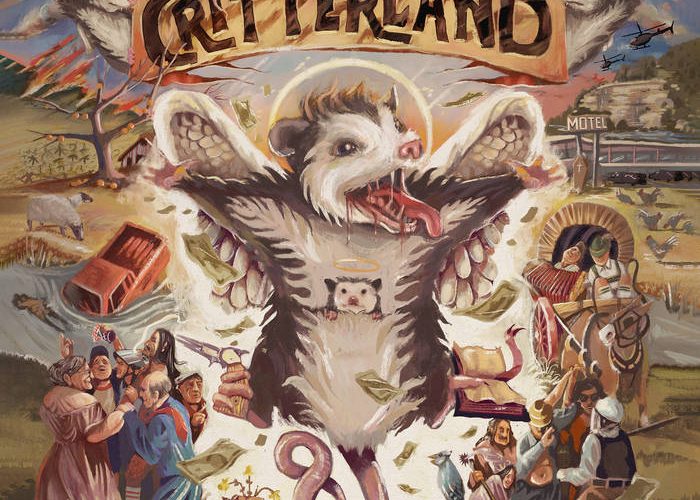By: CJ Jones
Willi Carlisle is a folk singer-songwriter whose first EP, Too Nice to Mean Much, was released in 2016. Since then, he’s put out three studio albums; the latest, Critterland, was released January 26. Carlisle is from Arkansas, an identity that is front and center throughout Critterland as well as his previous releases.
Critterland is a tour of grief, viewed through the lens of rural life. The album explores the complicated and sometimes contradictory emotions that grow out of loss. While it’s certainly a somber album, addressing topics like addiction and suicide often and thoughtfully, the overall tone is more bittersweet than despairing. Critterland is about loss, but it’s also about finding silver linings in the sadness.
First in the tracklist is the title track. “Critterland” is the album’s most positive lyrically, setting the album’s rural scene with imagery of the Ozarks and focusing on learning from the “critters” of the world. In the process, the song sets up the bittersweet tone that carries throughout the album, acting as a sort of thesis statement for the idea that love and community make the loss that eventually comes from caring for others worthwhile: the first chorus proclaims that “I am here for all the love that I can stand,” and the second shifts the line to “I am here for all the grief that I can stand.”
The next two tracks both deal with losing family members. Track two, “Dry County Dust,” begins with a domestic scene that is broken down over the next two verses, “chickens in the backyard” that are eaten by a fox and “Mom in the kitchen singing sweet by and by” whose funeral makes up the third verse. But after they’re gone, memories of the chickens and Mom remain to influence the song’s narrator. The third track, “The Arrangements,” also deals with a funeral, this time of the speaker’s estranged father. “The Arrangements” is full of complex feelings around death; though the father was already dead to the narrator, he expresses that “It’s still sad when bad men die.”
“The Great Depression,” like “Dry County Dust,” revolves around appreciating family and past communities that have come together to make the experiences available in the present.
The first half of the album concludes with “Two-Headed Lamb,” an homage to Laura Gilpin’s poem, “Two-Headed Calf.” This song breaks from the first-person storytelling of the rest of the album, acting as an intermission that applies the feeling of alienation from “Critterland” and many of the album’s second-half songs to another story. Unlike Carlisle’s narrator throughout the album, the farmer in “Two-Headed Lamb” overlooks the beauty of the world around him, and in the process misses out on much of what makes loss and grief worthwhile.
“Higher Lonesome” returns to first-person narration and memories of people that are gone, whether dead or just estranged, in bright instrumentals that still tell a story of longing. The feeling of solitude carries into the next song, “I Want No Children.” The narrator feels out of place in the close-knit community of Critterland, unable to fulfill the expectations placed on him.
The next track, “Jaybird,” expands on feeling out of place and returns to the earlier tracks’ reflection on dead loved ones. The narrator sings to Jaybird, whose feelings of alienation led them to suicide. However, they’re still with the narrator in spirit, and the whole song is about remembering and missing them.
“When the Pills Wear Off” deals directly with guilt, telling the story of a lover who died of an overdose. The narrator relies on pills to keep from feeling guilty for his death, or the deaths of other friends who have also dealt with addiction.
Critterland concludes with “The Money Grows on Trees,” a seven-minute track that is mostly spoken word, interspersed with short sung choruses. Backed only by white noise crackling, “The Money Grows on Trees” is the story of a weed-growing hippie working with a corrupt sheriff. Sonically, this track is a stark contrast to the rest of the album’s stringy country instrumentals, but thematically it calls back to “Critterland,” briefly lamenting lost opportunities but ultimately accepting and leaning into the choices the narrator has made despite the pain they bring.
The shared themes across Critterland’s ten tracks give the album a cohesive feel that lets the slow, accordion-heavy “Two Headed Lamb” lie next to the more upbeat harmonica and guitar of “Higher Lonesome” without seeming dissonant. The album carries strong lyrics throughout its runtime, making clear Carlisle’s role as a storyteller. It’s a memorial to the dead, both human and animal, that focuses on treasuring memories and keeping the past alive through stories.

